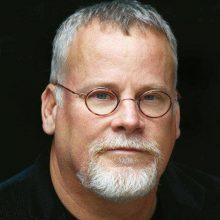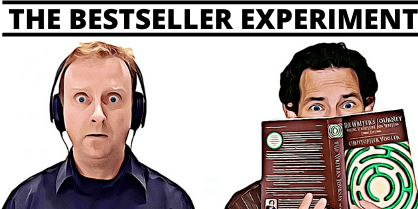EP07: Michael Connelly | 60 Million Thriller Books

Michael Connelly is one of the most successful crime authors in the world with over 60m book sales. Having just released his new Harry Bosch thriller, he shares secrets about developing characters & writing book series – in the back of a London cab!
LISTEN TO THE PODCAST
Click to Tweet: “Be relentless. Write every day.” @bestsellerxp @Connellybooks
GIVEAWAY
Our amazing Michael Connelly signed book giveway is now closed. Missed out? Take a look at our other incredible competitions here.
SPREAD THE LOVE
Thanks for listening and joining us. Have some feedback you’d like to share? Leave a note in the comment section below.
If you enjoyed this episode, please share it using the social media buttons you see at the bottom of the post.
SUBSCRIBE, RATE & REVIEW ON ITUNES
Please do subscribe on iTunes and leave an honest review for The Bestseller Experiment podcast. Ratings and reviews are extremely helpful and greatly appreciated! They do matter in the rankings of the show, and we read each and every one of them. Don’t forget, when subscribing to the show on iTunes you will get automatic updates.
If you have any questions, you can contact us here.
EPISODE HIGHLIGHTS
- Michael Connelly : Website | Facebook | Twitter @Connellybooks)
-
In this episode you will discover…– The secrets to writing a series character.– How you can make an emotional connection with the reader.– How much ego you need to be a writer.– And how fifteen minutes’ writing a day can make all the difference.
- Scrivener – The Official Writing App of the Bestseller Experiment
- Co-Hosts:
Links featured in today’s show:
- Bestseller Experiment’s Vault of Gold. Sign up to get your free Writer’s ebook
- Question Mark: Have a question you want answered on the show? Click here.
EPISODE TRANSCRIPT (HIGHLIGHTS)
Michael Connelly is one of the most successful crime authors in the world today. Starting out as a journalist on the crime beat for newspapers in Florida, he was short-listed for the Pulizter Prize, eventually writing for The LA Times. He has now written nearly thirty novels, which have sold over sixty million copies worldwide, and have been translated into thirty-nine languages, and his main series character, Harry Bosch, now has his own show, which was Amazon Prime’s first TV series and has now been renewed for a third season.
He was in the UK recently, promoting his new Harry Bosch thriller The Wrong Side of Goodbye, and Mr. Stay managed to grab some time with him in the back of a car between events in his busy schedule…
What keeps bringing him back to his series character Harry Bosch?
Unfinished business. There’s always more to say, and that’s why I bring him back. There are other characters I’ve written about and after one or two books I feel like I’ve said what needs to be said, so it’s a hard thing to pinpoint why is there more to say about Harry Bosch. I don’t really know, but he just remains intriguing to me and as long as you have that, as a writer, you’re going to dive in and go back to those kind of characters.
Is there a lot of Michael in Harry Bosch?
It’s fair to say that now. I’ve written about him for twenty-five years, and initially I wanted to write about someone completely different from me because I had no idea whether that book would ever get published and I wanted to have fun doing that the year or two that I wrote it. So, initially, we were nothing alike and then I got lucky and it got published and then there was a call for another book and another book and over time, keeping that separation was really impossible, so I started sharing more and more with him. Probably, most notably, we have daughters the same age, so the whole fatherhood concept is a shared experience between me and Harry.
Did he ever worry about running out of steam with a series character?
If you’re going to do this for a living, I guess you’re going to have some kind of level of confidence that you have more than one character in you. I always felt I would know ahead of any readers or critics that Harry’s run out of steam, and it’s time to end the series, so I would just come up with something else. I don’t want to ever be in a position where I feel like I’m keeping him on life support just so I can kick out another book. When I feel that, I feel it’s time to end the series.
Is his crime fiction redressing all those cold cases from his time as a journalist?
I guess it is in a way. Some of the books I’ve written have been inspired by stories I wrote as a newspaper reporter, that didn’t have endings. I remember when I retired from being a journalist I was clearing out my file cabinets at the newspaper. I had tons of files that I would open when there was a murder, or something that I wrote about. I would create a file and I would write the detective’s name and number and put anything that was pertinent to that case in the file, so I’d be ready to go as soon as they caught somebody. And I was getting rid of dozens of files of cases where they didn’t catch anybody, so it was a really like cold water in the face that I was leaving that world of reality to become a writer whose books always have everything tied up at the end. So it was kind of a dark day, but it was also a good reminder to not tie everything up, there’s always going to be loose ends, and yes I have to conclude a big mystery at the end of every book, because that’s why people read them. It was a great reminder to not solve everything, to always leave something untied, even if that bothers a reader.
It’s my little acknowledgment that crime fiction is quite different from crime non-fiction.
Is there a case he would want to go back to and re-open?
Yeah, there’s one called the Vic Weiss case, that I actually did write a novel called Trunk Music that kinda solved it. This was a guy who was a car dealer, famous because he did commercials in Los Angeles, who was found in the trunk of his car, shot to death, his Rolls Royce, in fact. And that was never solved, and I got to know the detectives on that case pretty well and spent time with them and they had their theories, but they had nothing they could ever prove. And it’s a lasting mystery in Los Angeles, and it would be really interesting to know what really happened.
On making an emotional connection with the reader.
It’s really important for me as a writer. I just don’t want to write a perfectly-honed plot. To me that’s window dressing. I always want to have a character at the centre of the story and that brings in the emotional stakes and so forth. And that’s how I get through a year of writing a book, that’s quite a different thing than reading a book that can take you two-three days a week. So I have to make sure I’m plugged in to write the book and if it works for me then it will work for the reader. But I also think that’s what the readers are looking for.
There is a percentage that just want to be fooled, or they want to outsmart the writer, and all that’s fine, but I think generally readers are looking for an emotional connection with a character. An emotional experience.
Has a reader ever given him feedback that surprised him?
It’s happened a few times. It’s funny, usually someone gets a higher meaning or metaphor out of something that you either had no idea about, or it was my subconscious, but it is there and it works. And, of course, your answer is always, ‘Oh yeah, I meant that.’
How has his writing technique changed since he started?
The big change is the distractions outside of writing. The actual work when you’re at your desk for me hasn’t changed. The changes are getting to that desk, getting the time to get there. There’s a TV show now, based on Bosch, that I’m involved in, there’s book tours and so forth, and my life has gotten more complicated and by that I mean it makes the time that I’m in a room by myself, in the locked room by myself, trying to create and write, it makes those times more precious, because they’re harder to get to. That room hasn’t changed, but I would say one thing that has changed is my ever-developing skill to be able to write when I’m not in that room. Like when I’m writing on planes, the back of cars, while waiting for planes, in hotel rooms, all that stuff. It’s kinda weird, it’s come back full circle to journalism where you just had to write every day and sometimes you had to write on the telephone, calling someone who’s writing it for you and working it out over the phone and so forth. More of a catch-as-catch-can lifestyle and writing style and that’s more like that now for me.
Does he outline before writing?
I went through many years of never outlining, and never putting anything on paper, it was just more fun to write that way. In my head I would know the beginning and the end and that’s all I needed to start off. And then, about four years ago, we started working on the television show based on Bosch, and we have a writing staff and we sit in a room and essentially outline: we put three-by-five cards up on the wall for each episode and they’re very heavily outlined in that way. And I began to see the merit in that, and that’s influenced my writing as of late. I don’t do the cards on the wall-type thing, but now I’m writing more stuff down in a notebook. Maybe that’s a function of age, or I’m worried that I’m gonna forget it or something? I wrote maybe twenty books without ever putting anything on paper other than the book itself. I don’t do that so much anymore.
I’ve enjoyed being in those rooms (on the TV show) where things are talked out. I’m so used to being in a room by myself, where I guess I could talk to myself if I wanted to, but basically it’s just me against the blank screen of the computer.
Did he have an endgame when he started?
I decided I wanted to specifically write crime fiction — not just ‘I want to be a novelist’ — when I was nineteen, and I didn’t publish a book until I was thirty-five, so it was a long process. First you want to see if you can accomplish it, second you want to see if you can be published, third you want to see if you can do it again. It’s too much of a long shot proposition to ever be thinking about becoming a bestseller, or hitting the top of the charts, or anything like that. I’d be lying if I didn’t say I didn’t think about that, once I was established and things were going well. If you have the ego of a storyteller, if you think the stories you write should be read and heard and watched, then you do think about the larger scale of things as you go along. But when I’m writing my first book that’s not even a concept. The concept is, ‘I hope this is a good book, I hope that someone other than my mother will read it one day.’
Does it take a lot of ego to write?
I guess so, I think it’s impossible not to put some of yourself in there. I don’t know if that comes out of ego, or if that comes out of ‘This is what I have, this is what I can reach, this is what I can fold into a story,’ but there has to be an ego. Harry Bosch has the ego that tells him that he’s better and smarter and more relentless than any of the opponents that he comes up against. He needs that. That lights his fire. So I think from the writing standpoint I go into it believing that this book I’m about to write, or am in the middle of writing, or finishing, should be published, should be celebrated, should be read by everybody, way more than whatever happens, but I think you gotta do that. It’s a long process. I’m actually a fast writer, but to me it’s a long process to write one book a year, to start with zero pages and zero words on the screen and know that you need a hundred thousand of them and they gotta be all connected and make sense and be thrilling and hit all the points that a reader wants in a book. It’s a bit daunting at the beginning, so I think it does take that kind of ego.
What happens on those days when you’re not feeling it?
Every writing teacher tells you this: if you’re going to be a writer, you gotta write every day, even if you only get fifteen minutes in. I do practice that, when I start a draft of a book I write every day, at least fifteen minutes, until I’m done with that draft, and then I might take a week off, and then I’ll go back and rewrite. So it’s not like I write every day of my life, but when I start a project I write on it every day until I get it done. And sometimes it truly is only fifteen minutes, because of things going on in your life, or hardships in the story.
But, if you hit a wall in the story I don’t think the answer is to take a day off. What I do is back-up and rewrite and usually create a momentum that takes me through the stalled part.
Does he write sequentially or does he write the fun parts first?
It’s A to Z for me. You know there’ll be a great chapter ahead, or a fun chapter, but jumping ahead to it… to me it’s like a reward if you get there. So don’t skip a part to get there. Fight your way through to get there and there’s a reward.
What’s next from Michael?
Keeping my head down and continuing to write. It’s the distractions that I fight now, that keep me from being in a room by myself and writing. I’m always trying to find my way back to that room.
What’s he reading at the moment?
I read less and less, because I can write most times before reading. So, on a plane I don’t read, I write. I don’t really take vacations. I might be on a Caribbean island somewhere but I’m sitting there with my laptop. When I do have time to read I would rather read non-fiction, biographies, things like that, that may have an inspirational effect on me. Reading about someone and how they create music — I have a huge collection of biographies of jazz musicians — and something about the way they create music is inspiring to me in terms of putting words on the page. And I write crime fiction so I got to keep my hand in crime fiction. I dabble around. Yesterday I picked up ‘The Plea’ by Steve Cavanagh, which is in the realm of ‘The Lincoln Lawyer’ so I’ll want to read about that and read what he’s doing and maybe there’s something there that will inspire something in the Lincoln Lawyer guy, so you never know. It’s good to be all over the place. I don’t religiously read any one author anymore, because I don’t have the time to do that and also see what’s new out there.
I think from the outside people think writers are all competitive.
The fact is no one reads just one book a year so there’s room for all of us to be successful and it’s more of an encouraging-type thing, so I’m not gonna read Steve’s book and think ‘I have to top this’, I’ll read it and probably have good feelings that somebody else is doing this well.
Michael’s Top Tip For Writers:
Be relentless. Write every day. Let it take over your life.
I hate to say it but you’ve got to sacrifice… not complete relationships, but you have to put relationships on hold and the writing should always come first. If you have a family, you find a balance, you can’t sacrifice a family relationship, but I constantly face a battle with my own family because I work at home and it appears I lead a life of leisure that my wife or my kid think I can just go do something, and I am constantly saying ‘No, I’m working.’
SHARE THE MEMES…
PODCAST TRAILER:
SHARE THE PODCAST WITH A FRIEND


